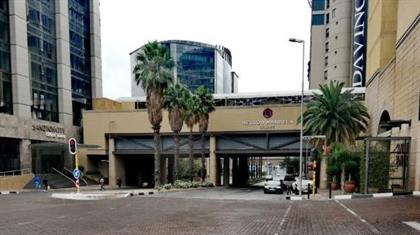It is 1pm on Friday and a few taxis dotted opposite the epicentre of shopping in South Africa, the Sandton City Mall, are the only symbol of life left in Africa’s richest square mile. Economic activity in Sandton has come to a grinding halt. Inside Sandton City and in the adjacent Nelson Mandela Square, security personnel and essential service workers keeping the malls clean boost the sombre foot traffic.
Security guard Njabulo Ndlovu says this is the quietest he’s ever seen Sandton and the empty mall makes him fearful that he might lose his job. “Some of my colleagues have had their shifts cut. They will only return on the 17th because many of the mall entrances are closed. The situation has to get better we’ll all lose our jobs,” he says.
Elsewhere in other Johannesburg malls, the atmosphere is the same. “The lockdown definitely had a negative impact on footfall given only the essential tenants are trading,” says Hyprop CEO, Morné Wilken. Hyprop owns nine malls across the country including Canal Walk, Hyde Park Corner and Rosebank Mall.
But Wilken remains optimistic about activity in Hyprop-owned malls past the lockdown. He says the company, which is one of several listed real estate investment trusts (REITs) who have withdrawn dividends for this year in anticipation for tough trading conditions brought by the coronavirus (Covid-19), is constantly communicating with its centre managers and tenants to plan its approach once lockdown is lifted.
“Our malls play an important role in our communities, which we believe they will continue to do during, and beyond, the current circumstances,” he writes in response to Fin24’s questions.
It won’t be just plug and play
About 1 500km away, in Cape Town’s V&A Waterfront, mall management is confronted by the same predicament. Usually abuzz with tourists this time of the year, the lockdown, preceded a few days earlier by travel ban regulations, led to an immediate drop in visitor numbers, writes CEO David Green in an email to Fin24.
“From what should have been peak tourism season footfall is down to a trickle – less than 10{e93887a69cdd95d753f466db084bbc3aa0067124675315461d28d68a72842cc2} of what we would normally experience,” he says.
Without tourists, most retail clients in the V&A Shopping Centre are at a loss. The centre’s management has had to step in by giving rent relief to some tenants and giving additional credit to businesses dependent upon tourism. Even bigger retailers are reaching out to us for support, says Green.
“Focus is currently on compliance with lockdown, keeping essential staff safe, helping smaller and more vulnerable tenants and stakeholders. It is too early to speak about attracting people back,” he says regarding the centre’s plans for boosting activity past the lockdown.
Shopping habits have adjusted
Keillen Ndlovu, head of listed property funds at Stanlib, says while South Africans love to go to malls, there will be initial hesitance to be in public and entertainment spaces even when the lockdown is lifted.
“We are approaching winter and people will initially be uncomfortable to be around coughing or sneezing people. People are getting accustomed to dining at home and it’s cheaper as well. Some segments of the market – though still small – are shifting to online shopping, even for groceries,” says Ndlovu.
He says what will worsen the situation is that consumers may be more concerned about the future now, fearing that a weaker economy and the recent rating downgrade to junk by Moody’s has jeopardised their job security. With consumer confidence dented, their spending will follow suit. And because of this, some tenants, especially the smaller shops with smaller balance sheets, may not survive.
Richard Cheesman, senior analyst at Protea Capital Management, says as the experience of countries like China, who have come out on the other side of a lockdown, has shown that things are unlikely to go back to the way they were pre-lockdown.
“That is also before considering the possibility subsequent lockdowns,” he says.
Compromises will have to be made
Cheesman says all the different groups involved which include retailers, REITs and banks or bondholders will have to cooperate to find a solution.
“How this will be worked out between all of them will probably differ depending on the specific institutions,” he says. He adds that each of these stakeholders has something to lose, making it ideal to find a compromise. If a REIT is rigid, a retailer can move. Banks also don’t want to take over malls, so they are expected to be accommodating to avoid a spike in bad debts.
“Similarly, there is probably room for retailers and REITs to negotiate somewhere between paying full rent or no rent for the affected period,” says Cheesman.
Ndlovu says he believes that malls will be accommodating when it comes to rent reductions or rent payment deferrals under tougher circumstances on a case by case basis.
“This was a trend that was picking up anyway and will be accelerated by the negative impact of the coronavirus. In this environment, landlords have to do the best they can to nurse ailing tenants. It costs more to lose a tenant than retain one,” he says.
Ndlovu adds that mall owners will also need to be more innovative to attract shoppers at the malls.



More Stories
Must-Know Business News to Stay Ahead in 2024
The Latest Business News Shaping the Global Market
How Business News Is Influencing Economic Growth